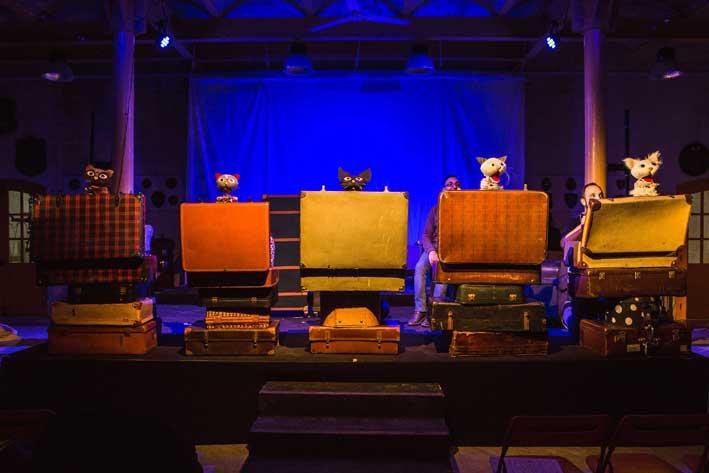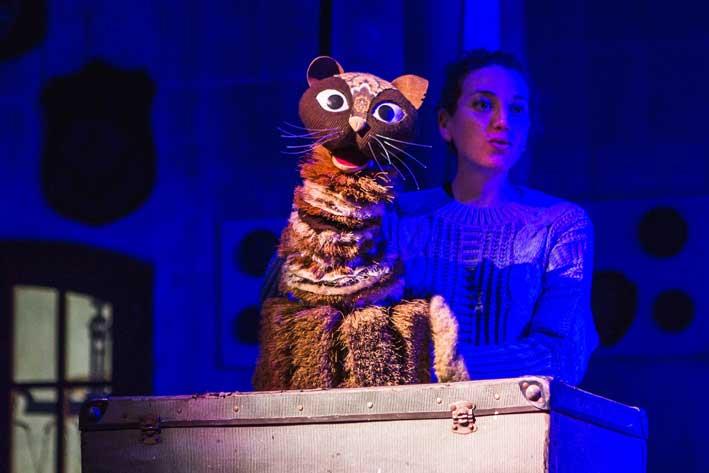Tell us about the process of developing Clare Azzopardi's award winning children's book
Il-Qtates ta' max-Xatt into an opera together with Clare herself and composer Euchar Gravina.
We started working on this back in January 2018, when we began looking at ways we could expand this beautiful story and develop into a libretto for a 40 minute piece. We knew we needed a nice balance of humour and action to work with the elements of melancholy present in the story. So we met several times and we sent lots of ideas back and forth. I started working with Clare first, and we both agreed to develop certain themes such as nostalgia, memory and loyalty. Clare went away and worked on the libretto and when we were happy with it, we sent it to Euchar who began composing sketches. Gradually over the next few months we made choices such as which voice type would sing which role, and opted to make Nannu non-singing to add to the immediacy of his moments. Euchar completed the score and began orchestrating it, but throughout the rehearsal period the changes have been ongoing- if we find something which needs to be altered or perhaps isn't working as well as we would like, we have the luxury of both writer and composer being on hand to make changes.

You're no stranger to the world of children's musical theatre or opera, what makes this show so unique and how do you normally treat directing operas specifically made for children?
This is the first children's opera I have worked on here in Malta, it is an area which is quite unexplored everywhere to be honest. Opera still has a bit of a label (although I do think this is changing slowly) of being something elitist or inaccessible, so it is very important to show young audiences how easy it is to relate to this genre. It's always important to make the staging clear and fun for young audience. I have tried to keep the piece very visually stimulating with a few elements of surprise, and to keep the pace lively and energetic. I think children like to be entertained but I also think it is important to allow them moments of reflection, to give them some time to breathe within the piece and have the opportunity to look at the 'nuts and bolts' of the piece. The orchestra is in full view, as is the conductor; there are no wings so the off-stage area is visible and they get to see the actors change costume and become different characters.
How important would you consider exposure to music and opera for young school children to be?
I was an opera singer for over 20 years, I trained for almost 7 years at the Royal College of Music in London and music was and is a huge part of my life. The only reason this came about was because when I was 7 years old a group of singers from Scottish Opera came to my primary school and performed some extracts of Hansel and Gretel. They workshopped the piece with us and I was chosen to be the witch. Apparently I was very convincing... That day I went home and told my Mum I was going to become an opera singer. I begged and badgered until she agreed to send me to piano lessons and when I was 9, I was given a free trombone at school (in those days primary students were all entitled to free music lessons and instruments, can you believe it??). That was it for me. Music became my life. I did not come from a wealthy family, quite the opposite, but the opportunities were there in those days for people from backgrounds like mine. Kids like me from towns like Paisley (not a mecca for opera) were allowed to experience music and training and opera and it absolutely changed my life.
So I would say exposure to music is beyond important- it is essential. It doesn't matter if you don't become a musician, listening to music (whatever kind of music that may be) feeds your soul. More and more nowadays we are producing 'identikit' children. We have designed an education system which, for the most part, is based on standardisation and conformity and I fear that it is suppressing individuality, imagination and creativity. I cannot emphasise enough how vital the arts are in the lives of children and young people. As you can see, I get very heated about it!

Apart from being a children's opera this endearing piece is also a puppet show! What makes directing a singing cast with puppets so different to any other?
You should really ask the singers this question- it's definitely an extra pressure on them. They have to focus on staying with the conductor, executing the staging, singing AND they have to create a living, breathing character complete with tail and moving mouth! Sometimes we rehearse without the puppets, so we have the singers play the characters themselves- this helps them discover more about their puppet alter-ego, so that when they go back to using them, they can start adding more detail and texture. But it's definitely harder for them- no question of that. Luckily I have a cast who are so brilliant and so game for anything, this challenge has proved to be fantastic fun.
An equally important part of your cast are the 5 adorable puppets made by Matthew Pandolfino. Tell us more about these puppets
Anyone who knows me knows I am cat crazy. I am perfectly happy to be the mad cat lady of Balzan, I much prefer them to people and am the owner of a huge soppy fat cat called Jasper (definitely the inspiration for one of the puppets). Having the chance to work with cat puppets was such a joy. Matthew Pandolfino is a genius and there is no other word for it. We had discussed the idea of a slightly 'deconstructed' cat, so we knew we wanted heads and tails. We knew we didn't want paws, so the faces had to be very expressive. How he has managed to make these inanimate creatures so expressive is beyond me. As I say, he is a genius. The puppets have so much character- each one has their own personality.
Tell us about these cats...
Kannell is the matriarch of the group, the old lady she keeps everyone in check and has known Nannu and Nanna for many years; Pinzell is her great-great-great-great grandchild. The kitten of the group, full of fun and mischief, but slightly in awe of the other naughty cats. Pippistrelle is our extravagant, attention-seeking cat. Sleek and black and always eager to be in the centre of things. And finally Pilatu and Cippitatu. The two naughty boys, best of friends and enemies. Cip thinks mostly of his tummy and is always on the hunt for food. Pilatu is the kindest soul, gullible and easily led. When he isn't fighting with Cip, he is being fooled by him, playing with him or just cuddled up next to him dreaming of snacks.
It's curtain up on school shows and public shows in a little under two weeks. Why should everyone be circling their calendars to come watch this show?
Children's operas are few and far between. Children's operas with cats as the main players are even fewer and further between. The piece is fun and moving and happy and sad in equal measure. The cast and the cats are outstanding and we will be performing in the beautiful maritime museum in Birgu. Bring your children along and introduce them to this amazing artform. If you don't have children, come along yourself- I believe this piece speaks to all ages.
Il-Qtates ta' max-Xatt is a collaborative work in partnership with Arts Council Malta, Festivals Malta, the Three Palaces Festival, Culture Pass Malta, The Ministry for Education and Employment, LESA and Heritage Malta. To book your tickets or for more information on this playful piece visit teatrumalta.org.mt or call 21220255 for more information!